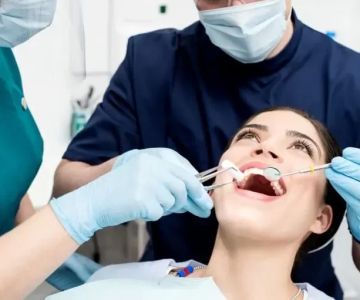Understanding Dental Emergencies
Dental emergencies can range from knocked-out teeth to severe gum infections. It's crucial to know when to act quickly. A knocked-out tooth, for instance, requires immediate attention from an emergency dentist, regardless of the time of the accident. On the other hand, a lost porcelain crown may not be as urgent but still needs timely treatment.
Urgent and Non-Urgent Situations
Some dental emergencies are urgent, like a dental trauma outside of office hours. In such cases, your first call should be to the emergency dentistry. The answering machine message will guide you on reaching the dentist. However, non-urgent situations, like a filling that falls out on a weekend, can wait until normal business hours.
Common Dental Emergencies and Their Treatments
If you experience a severe toothache that persists for more than a couple of days, accompanied by difficulty swallowing or breathing, or fever, it's a serious matter. A dental abscess, which is a painful infection at the root of the tooth, won't heal on its own and requires professional treatment like a root canal. Gum problems, such as bleeding that can't be controlled or accompanied by severe pain and other symptoms, also demand urgent care.
Other Indicators for Emergency Dental Care
A loose tooth, especially in an adult with good oral health, is a cause for concern. It could be due to various reasons like a tooth injury or a severe infection. Constant headaches, numbness in a tooth, or a persistent metallic taste in the mouth can also be signs that you need to visit an emergency dentist.
Managing Symptoms Before Seeing the Dentist
In case of a dental emergency, there are certain steps you can take to manage the symptoms. For a knocked-out tooth, pick it up by the crown and rinse the root with water. Try to put the tooth back in its socket if possible. For a severe toothache, rinse your mouth with warm water, use dental floss, and take over-the-counter pain relievers. Apply a cold compress to help with the pain and swelling.
Emergency Room Options
If your dentist's office is closed and you have severe tooth pain, you can go to the emergency room. The ER staff can provide medications to ease the symptoms, but they don't perform restorative treatments. You'll still need to see your dentist as soon as they're available.
Finding Affordable Emergency Dental Care
No one plans for dental emergencies, but when they occur, it's important to find affordable and quality care. Many dental practices, like Bright Now! Dental, offer emergency services and accept various patients, regardless of insurance status. It's advisable to find the nearest location and inquire about their emergency dental care services.
In conclusion, knowing when to visit an emergency dentist is essential for maintaining good oral health and preventing further complications. By being aware of the signs and symptoms of dental emergencies and taking appropriate actions, you can ensure timely treatment and minimize potential damage to your teeth and gums. Don't hesitate to seek professional help if you're in doubt about the severity of your dental condition.



 Westgate Dental Arts
Westgate Dental Arts Coventry Family Dental
Coventry Family Dental Familia Dental
Familia Dental Dr. Daniel S. Fife, DDS
Dr. Daniel S. Fife, DDS Dentistry At Suburban Square: Michael I. Wollock, DMD
Dentistry At Suburban Square: Michael I. Wollock, DMD Comfort Care Dental
Comfort Care Dental The Importance of Oral Health Education During Pregnancy for a Healthy Pregnancy
The Importance of Oral Health Education During Pregnancy for a Healthy Pregnancy Why Skipping Dental Checkups Can Lead to Bigger Oral Health Problems
Why Skipping Dental Checkups Can Lead to Bigger Oral Health Problems Best Tips for Brushing Your Teeth Properly for Healthy Gums: Essential Techniques for Oral Health
Best Tips for Brushing Your Teeth Properly for Healthy Gums: Essential Techniques for Oral Health Advantages of Porcelain Dental Restorations
Advantages of Porcelain Dental Restorations How Can Diabetes Cause Tooth and Gum Problems? Preventing and Managing Oral Health Issues
How Can Diabetes Cause Tooth and Gum Problems? Preventing and Managing Oral Health Issues Healthy Habits for Promoting Good Oral Health and Hygiene: Tips for a Healthy Smile
Healthy Habits for Promoting Good Oral Health and Hygiene: Tips for a Healthy Smile